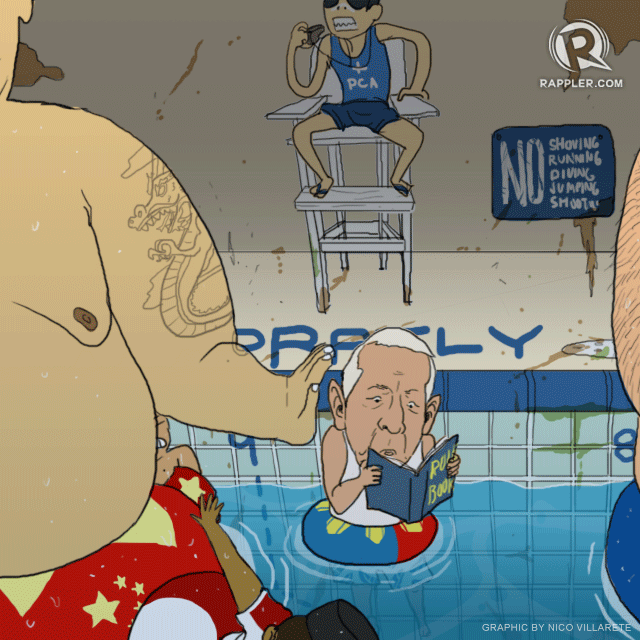SUMMARY
This is AI generated summarization, which may have errors. For context, always refer to the full article.

More than a week after President Rodrigo Duterte has taken his oath, his government faces its first major foreign policy challenge.
On July 12, the Permanent Court of Arbitration (PCA) will issue its ruling in the historic case filed by the Philippines, seeking to annul China’s sweeping claim over the South China Sea. The Philippines claims part of these disputed waters, calling it the West Philippine Sea.
It is widely expected that the PCA, the UN-backed arbitral tribunal, will decide in favor of the Philippines, which won the first round of the case. The PCA, based in The Hague, Netherlands, had rejected China’s argument that it had no right to hear the Philippines’ case.
The upcoming ruling, or the final award, will resolve some of the legal issues that have to do with the “interpretation or application of the provisions of the United Nations Convention on the Law of the Sea,” wrote international law expert Robert Beckman, but “not address issues of territorial sovereignty or delimit maritime boundaries.”
Thus, Beckman points out, it is up to the Philippines and China and other countries with a stake and interest in the South China Sea disputes to adhere to the tribunal’s decision and negotiate, in good faith, to resolve issues of military presence, protection of the marine environment, and sustainably managing the fisheries resources.
China has refused to participate in the case and has said that it will ignore the arbitral tribunal’s decision.
Herein lies the primordial diplomatic task of the Philippines: to gather robust international support so that the ruling is enforced, so that China gets to sit with the new government at the negotiating table and abide by the tribunal’s decision.
Is Foreign Affairs Secretary Perfecto Yasay Jr up to the job? There is reason to be concerned as the country’s top diplomat displayed a tendency to be cowed by China during the first Cabinet meeting.
Here’s what Yasay said: “The bottom-line question is, what will happen if the decision is in our favor, meaning that the arbitral tribunal will make a declaration about the legality of the 9-dash line, and will say that this is part of our economic zone, including Scarborough Shoal? What if, in the face of these circumstances, China will dig in and put us to a test? They will disallow again our fishermen from fishing in Scarborough Shoal.”
Yasay’s sensitive remarks appeared to be inadvertently aired by the state-run RTVM, which was broadcasting the meeting live. It abruptly went off the air as the foreign affairs secretary was speaking.
In a press conference the day after, the foreign affairs secretary clarified that there is no reason to be afraid of China, saying the government will avoid making “provocative statements” so that both countries can enter into peaceful negotiations.
Yasay can take the cue from Justice Antonio Carpio, a leading expert on the issue. He has said that the new government can hold bilateral talks with China after the ruling is released and use it as leverage.
Another move could be for the Philippines to go to the United Nations general assembly and sponsor a resolution and compel China to comply, Carpio also said.
The Philippines enjoys the support of many countries including the US, Japan, Australia and Vietnam in its case versus China. France has called for a “respect of the law of the sea” and urged Europe to push back against China in the South China Sea.
A recalcitrant China is bound to suffer a cost to its reputation if it persists in ignoring the arbitral tribunal. As Paul Reichler, the main Philippine lawyer in the case, has said, China risks being regarded as an “outlaw state.”
Yasay has little time left to study the country’s options—but there is no shortage of brain power and literature to consult. What he, backed by President Duterte, needs is the courage to stand up for the Philippines’ interest. – Rappler,com
Add a comment
How does this make you feel?
There are no comments yet. Add your comment to start the conversation.